Now that I’ve taken you on a long (winded) play-by-play through Tamra-the-story, let me take you on a walk through Tamra-the-drama. What Tamra-the-drama does is take the simplicity of Tamra-the-story and create a vivid portrait of people who may be fictional, but feel alive.
Trust me, this is hard. I do not personally relate to anyone in most sageuks (I am not the long lost heir to the throne, my family wasn’t slaughtered by a vengeful slave half-brother, I didn’t fall in love with a guy only to find out he’s my brother and have him kill the other guy I love, etc.). Their plights are often gut-wrenching or heart-pounding, but we are engaged on a meta-emotional level, not on a personal I-lived-through-this level.
To create such a story, the stars have to align properly. It must be about the common folks, the situations have to be realistic yet straightforward, and the characters have to be fully realized. All of this happened in Tamra. Combined with a lyrical soundtrack, excellent and charming directing, and effortless acting by (most) of the cast members, Tamra nailed every element on how to make a successful drama. Well, except for one – Tamra was horribly marketed and terribly under-promoted, leading it to fall victim in the ratings game.
The purpose of a journey is so that you can come home again:
Why does Tamra make such an impact on a viewer, namely me? It moved me by creating a fairytale imbued with the essence of the ordinary life we each lead. How can that be, you ask? We are not lady divers in Tamra. We don’t run away from home to set sail for the mysterious Orient. We don’t walk around with a stick up our butt conducting undercover investigations.
Tsk tsk, you’re being too literal, my chingus. Tamra takes universal themes of longing for a different purpose in life, the desire to explore, the conflicts stemming from friendship, family, duty and honor, and packages it in a sageuk setting. Tragedy does not abound on Tamra, especially not to the point of you asking “just how much crap can happen to one person.” What the drama focuses on is the human element of what constitutes life’s many struggles.
Watching Tamra is a personal expedition, mirroring the trip taken by William to Joseon, Beo Jin to Hanyang, and Park Kyu to Tamra. I felt like I had traveled a short lifetime with these buddies of mine. When the drama ended, the sojourn had come full circle. I was back at home, but felt like I have traveled a long ways.
I was happy to have visited Tamra, knowing that folks in a make-believe story had found where they were meant to be. The imaginary journey I took was meaningful not just in entertainment value, but having learned to appreciate the inherent beauty and joy in living.
You are all so precious to me:
Aside from the occasional token plot-device character, Tamra is littered with delightful fictional creations who fairly leap off the screen and into your consciousness. Days later I still find myself giggling about certain minor characters and their tics and foibles. The most amusing and poignant bunch of secondary characters are, hands down, the villagers of Tamra.
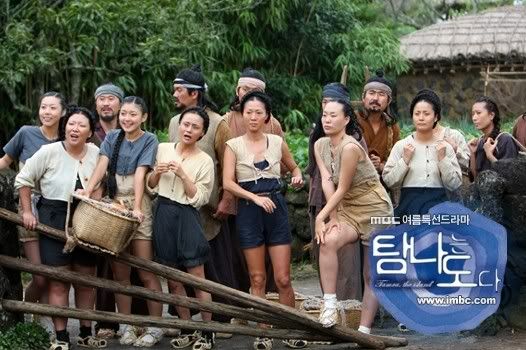
It’s a female-led society. The moms trudging off to work in the fields and dive in the ocean, the dads staying home and braiding straw sandals. While this gender-reversal can be milked for laugh, it’s not. It’s treated with respectful matter-of-factness. The only thing funny is how Park Kyu, being a banished no-good lecher, and a male to boot, fits into the Tamra totem pole. The Great Park Kyu is regarded as a loafer and a moocher, if you must know.
My favorite comic relief was Keut Boon, Beo Jin’s leading rival for lady diver supremacy, and reigning “beauty” of Tamra. She’s the best diver amongst the younger generation, but she chafes at all the diving opportunities thrown at Beo Jin. She’s frightfully brassy and ballsy when it comes to enticing the men, yet childishly sulky when it comes to the attention Beo Jin gets from everyone. Every scene with Keut Boon brought a giant goofy grin to my face, no joke.
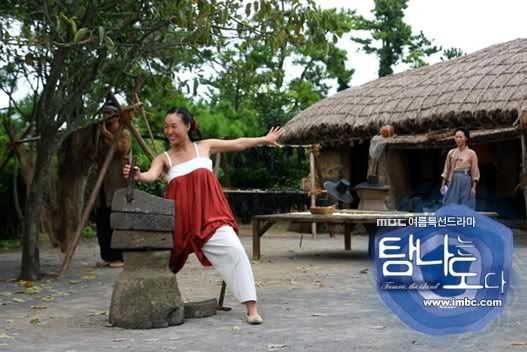
Jeong Joo Ri, who played Keut Boon, is a budding character actress that I foresee will grow into a stalwart of playing the drama mom roles that are so crucial yet easily overlooked. I don’t want to overlook her in this review because her performance was delightful and unforgettable. Keut Boon is fierce, and don’t you forget it!
Everyone on the island of Tamra has so much flavor and personality that I miss them more than I have missed any group of fictional characters before. Daddy Beo Jin (whose name is Won Bin, btw, mwahahaha) is a gentle man with patience and sincerity. Beo Jin’s little sister Beo Sul is a wise old soul, and a budding artist. We see her draw “picture stories” that are a playful nod to the manhwa origins of this drama.
The village potter, who initially gets frightened witless by William, in the end becomes the first the hug him goodbye, with fond wishes that this foreigner with artistic skills would stay on Tamra and be his “successor.” How cute are these people? So cute I vote them collectively “Coolest Sageuk Characters I Want to Drink and Hang Out With.”
Can I call you Mom?:
The most memorable and understated performance in the entire drama, including by our three leads, comes from Kim Mi Kyung, who plays Beo Jin’s mother, matriarch of the Jang household, and Head Diver of Sanbang Valley.
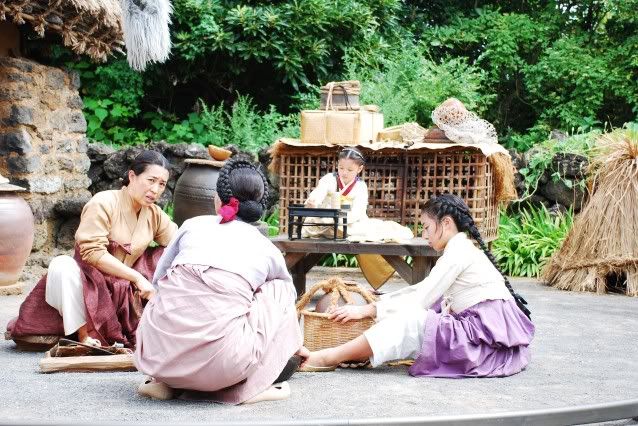
Momma Beo Jin is so near and dear to my heart. I ache when I think of this character, her integrity, her heart, her decency. This is a woman born on Tamra, will die on Tamra, and in between, she will live each day with every ounce of dignity regardless of her lot in life. I respect that so much it hurts to see how stoically she bears up against problems big and small.
With common sense she leads her lady divers into the sea time and again, getting them safely home at the end of each expedition. With love that is implicit but never spoken, she takes care of her family with tenderness that belies her usually emotionless demeanor. When Daddy Beo Jin flirts with her, she reciprocates in the stiffest way that will crack you up. She has no time to coddle Beo Jin, to sit down and carefully counsel her beloved daughter that she has to keep diving until she gets better. There is no alternative, not when you are a commoner girl born on Tamra.
Momma Beo Jin and Park Kyu develop a relationship that is equal parts mutual respect, understanding, and an implicit comprehension that the other person loves Beo Jin as much as he/she does. It’s a mother-in-law to (future) son-in-law relationship that is poignant in its unspoken companionship. Contrast this to Momma Kyu’s fawning yet controlling claws on her son, and it’s no wonder Park Kyu prefers the wisdom gleaned from this poor diving woman.
Everyone in Hanyang, I wish you’d all drop into the nearest ditch and then have a ton of cow manure fall on top of you:
The second half of Tamra takes place almost entirely in Hanyang and its environs. With great reluctance, I ought to devote some time to the gaggle of (mostly) distasteful folks we meet in the capital city of Joseon. As charming as our sojourn on Tamra, Hanyang is the exact opposite. We leave behind the simple warmth of wind-swept Tamra for the calculating stifling air of Hanyang.
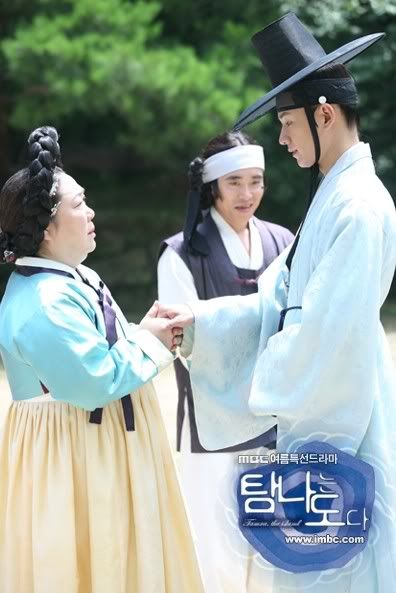
First up on the list is Momma Kyu, played by the always wonderful character actress Yang Kee Kyung (I swear, between her and Song Ok Sook, together they have played every single actor and actresses’ mom in a drama). Momma Kyu is like Park Kyu without a heart, all entitlement and hauteur with nary a kind bone in her considerable girth. Even her servants are just like her – the one lady servant in the Kyu household who attends to Beo Jin does so with a supercilious and condescending air.
Momma Kyu is a necessary evil, and really a source for a lot of laughs at her expense, but ugh if she doesn’t trigger the urge to barf (on her). We also need Momma Kyu around so she gets the put down she so richly deserves from Momma Beo Jin. The showdowns between Momma Kyu and Momma Beo Jin are epic. You don’t need even three guesses to know who wins. (The one confrontation between Beo Jin and Momma Kyu, subsequently, will have you crying tears of joy and happiness, screaming “you go, girl!”).
There are a handful of scheming politicians scurrying around Hanyang, and they don’t even merit giving them a name or number. The Gang of Dirtbag Pols are in Seo Rin’s pocket, and we only put up with their very existence because we know they will get their comeuppance in the end.
The head dirtbag politician even gets his daughter engaged to Park Kyu, in an effort to align the Park family to Seo Rin’s cause. This (temporary) fiancée of Park Kyu’s is a pinchy-faced snotty girl who I was dying to see get figuratively smacked upside the head after she torments our Beo Jin time and again (and she does, oh yay, and its at the hands of Park Kyu in defense of his Beo Jin, double yay).
Secondary Lead actors of Tamra, please stand up for your round of applause:
Amongst our five leads in this drama, Yan, played by Lee Sun Ho, gets plenty of screen time but little mention in my summary of the story (and little recognition by Tamra-lovers). To rectify that, I’ll start my ode to the fabulous lead actors with him.
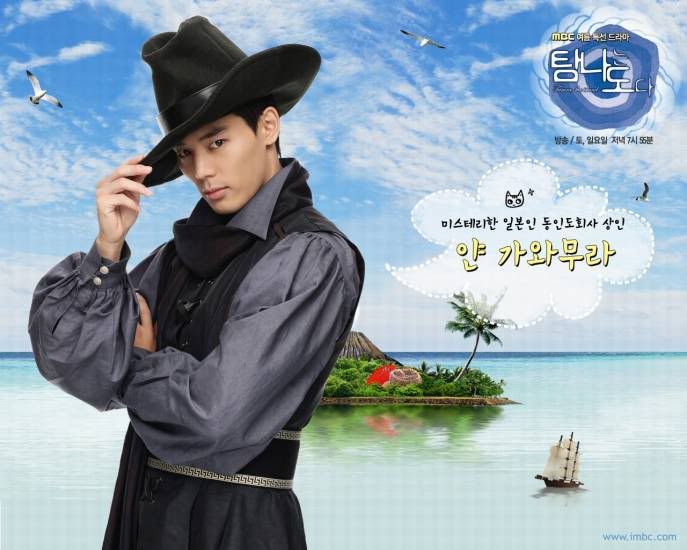
Yan Kawamura is a man of mystery from the beginning to the end of the drama. Oh, we get his backstory eventually (Yan was actually born to a Korean father who was captured by the Japanese), but his motivations remain as murky as his expressions. A man of few words and no wasted actions, Yan appears to function as a plot-device leading character (he ought to be called Yan The Fixer, as he often appears to get any one or more of the Love Triangle out of trouble at anytime).
But I see Yan differently. His mystery is a shroud for his disengagement with the world around him. He travels because he has no home, no country, no ethnic identity. His involvement with the-dude-who-won’t-go-home serves as the catharsis for him to confront his detachment from his birthright, being a Joseon citizen.
Lee Sun Ho was a marvelous Yan, his performance only seeming stiff and wooden because Yan is so very stiff and wooden. Lee Sun Ho’s buzz cut, killer cheekbones, and imposing bearing make his Yan modern and unfathomable. Like the sea that surrounds Tamra. But a dive into its depths shows us that Yan has layers and honesty when it counts.
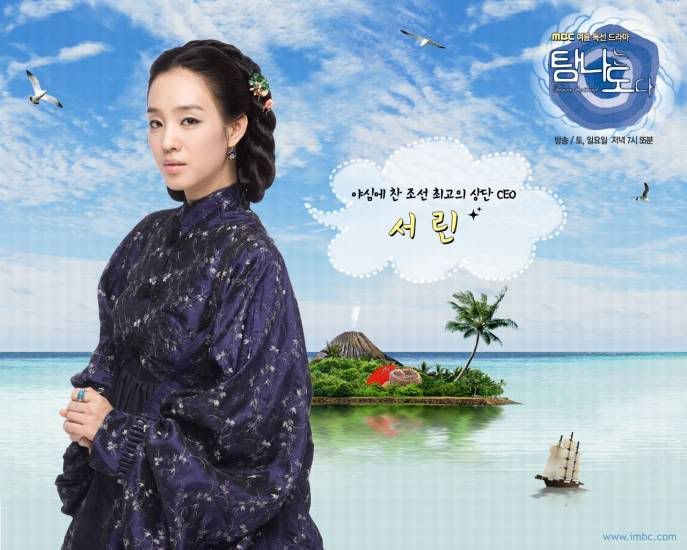
Seo Rin is also a cipher, in that she skulks around for the majority of the drama. All while plotting in a seemingly Child’s Play sort of way, if you ask me. Nonetheless, the actress who plays Seo Rin, Lee Seung Min, did a credible job of mining a rather one-note villain for dramatic effect. She glided around the screen like a dangerous gisaeng, enunciated word for word to add that extra veneer of a mastermind fomenting a conspiracy, and generally was a performance that the screen loved.
It doesn’t hurt that Lee Seung Min is elegant and gorgeous, lending an air of fallen nobility as befits her character. I think what hampered Seo Rin was more the character construct and dialogue, everything Seo Rin did was so obvious that she had a nefarious purpose. She fair screamed “I’m plotting something big and dangerous” from her pores. Subtlety she had not, but the performance by Lee Seung Min was calm, controlled and lovely, just like Seo Rin herself.
Participants in K-drama’s most functional love triangle, please come here and take a bow:
William Spencer first bounces on screen in an entrance worthy of inclusion in the “embarrassing drama moments ever” hall of fame. [I actually think this entire section should have been drawn as a manhwa montage, and the real live action drama begins after William sets sail for his grand adventure, just my two cents]. But Hwang Chang Bin (née Pierre Deporte) overcomes this mock-worthy acting debut to truly become a young man who yearns for adventure, and gets more than he bargained for in return.
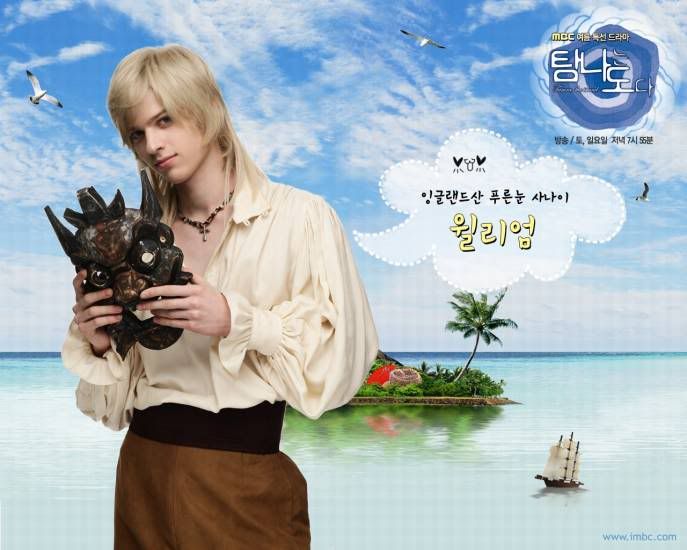
William is a wonderful human being from his very core. His decency is not hidden, but consistently self-evident. He’s a giant kid at heart, which makes his connection with Beo Jin so natural and winsome. His destined visit to Tamra was not to awaken his inner softie, but to mature his inner child.
Hwang Chang Bin is not the most polished actor, regardless of his fluency or lack thereof in Korean. Part of William’s awkward acting in the first few episodes I blame on his character being an Englishman, when the actor is a Frenchman. The English-lines are stilted, but this issue is quickly swept away when William learns to speak Korean, which the actor himself speaks fluently.
But what he lacked in finesse and technique, he made up for in a natural and unassuming effort. His performance as William was a very promising start for his acting career. He conveyed the joy of a child experiencing new wonders, the adoration of a boy in love, and the apprehension of a young man forced to fight for his own survival.

What is there I can say about Seo Woo that hasn’t already been discussed to death in the drama blogsphere? (Oh, oops, the debate is raging about THE Seo Woo in Cinderella Unni, not THE Seo Woo in Tamra? Great, because I’m only here to talk about the Seo Woo in Tamra, got it?) The first time I watched Tamra, Jang Beo Jin annoyed the heck out of me. Clearly this sentiment no longer stands, but I mention it only to discuss what makes this character affecting in good and bad ways.
Beo Jin is the type of inept, bumbling, graceless girl who runs around mucking up the robot-like efficiency of someone else’s hard work. I’m a robot-like efficiency type of person, so Beo Jin is normally my kryptonite. Seo Woo, with her Bambi eyes and lush petite figure, portrays Beo Jin as a girl on the cusp of womanhood. All limbs that flail about every which way, and a heart full of dreams that can never come true.
Her transformative trip is the least dramatic of the leads. Leaving Tamra, she discovers in the process that Jang Beo Jin never needed to change. She simply needed to find her place in her world, not as a diver (which she sucked at), but as a bookkeeper of the island offerings.
Seo Woo *was* Jang Beo Jin (I don’t know where Beo Jin ends and Seo Woo begins – and my God, this girl can cry, all torrents of salty tears, reddened nose and quivering lips). Her Beo Jin was down-to-earth, puddles of puppy-dog eagerness and stubbornness. She showed us a Beo Jin that was not a girl anymore, but not yet a woman. What annoyed me about the blundering Beo Jin conversely becomes what is so endearing about her. She tries so hard at everything she does, with her heart on the line and her very breath heaving to do it well and do it right.
Like any fairytale princess, Beo Jin’s journey was more about finding her prince charming. And she does find him, oh yes she does, a few hot kisses, a couple of adorable pseudo-dates, and some heartbreaking fights later. She finds THIS guy. [Gimme a minute to compose myself here. Ah frak, forget composure…..squeeeeeeeee.......*falls into a heap of drool*].
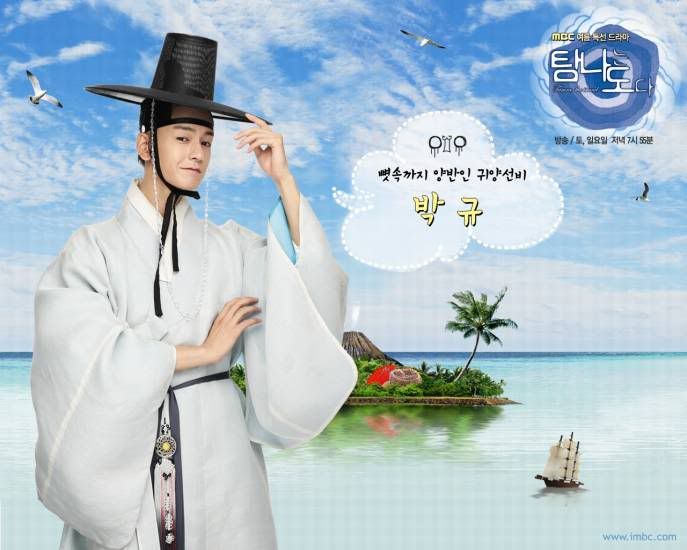
Im Joo Hwan is Park Kyu: he of the perpetual whiff of snobbery, nary of speck on dirt to be found on his white robes, and general loftier-than-thou-demeanor. Here is a nobleman turned undercover investigator turned man in love turned man who has found his goal in life. Im Joo Hwan nails each and every subtle emotional turn required of this character.
I cannot stress enough how much I love both Im Joo Hwan’s performance as and the character of Park Kyu. [I first saw Im Joo Hwan as the second lead in Snow Queen. He was cute but not terribly memorable. Then he went and blew my mind in Tamra]. He captured the innate nobility of a privileged and intelligent young man, and conveyed the inner struggles of a noble reassessing his perceptions of the world and his place in it.
As Park Kyu begins to fall in love with Tamra, and with Beo Jin, we see this young man’s face light up little by little, until he gives that first wide-open smile. And our collective hearts just stopped beating for a second. [Mr. Koala actually spent MINUTES talking to me about Park Kyu’s smile, what it meant, how it was so wonderful to see, blahblahblah – I was both astonished and slighty worried I may need to re-assess his sexual orientation]. Im Joo Hwan as Park Kyu has that combination of grace, charm, and boyish intensity that melts our ahjumma hearts and makes us his slaves forever.
My full-blown unabashed adoration of Park Kyu probably sounds rather like I’ve contract some sort of mental disease. I have no problems conceding when I, for inexplicable reasons, adore an actor. But the love of Park Kyu and Im Joo Hwan is not a disease which afflicts only me. Remember I mentioned Team Park Kyu? Before watching Tamra, I quizzically pondered why folks would create a team in support of one guy. After watching Tamra, I bought myself a lifetime membership. I dare you to watch Tamra and remain dispassionate about this amazing young man.
Park Kyu has some imperfections, which serves to make him human and vulnerable. Yet his weaknesses are more than made up for by all his many virtues (one of which is smiling so adorably it makes my knees go weak, the other is kissing the living daylights out of a girl). That about evens it out, and we can all agree that Park Kyu = perfection, okay?
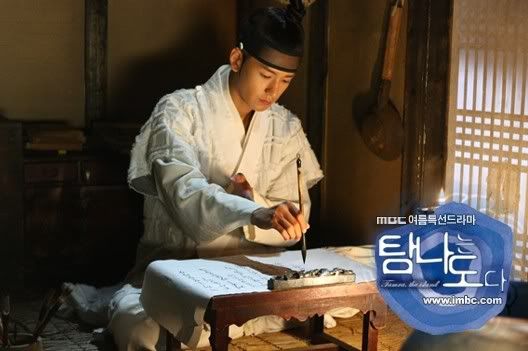
Don’t think that my fawning over Park Kyu means that I’m knocking on Willy Boy over there. I’m not. William is really second-to-none in his decency and devotion to Beo Jin. All I can say is, Team William is awesome (Beo Jin gets to be an English lady with a man that worships her), but Team Park Kyu is awesomer (Beo Jin gets to stay on Tamra with her family, be the wife of the Chief Magistrate, with a man who loves her like no other). At the end of the day, I can only go with awesomer. Can you blame me?
Beo Jin and William: its love as pure, innocent and adorable as a litter of puppies, without any saccharine aftertaste.
William and Beo Jin has been described, by myself and others, as akin to a first love, or a tropical storm (comes fast, leaves faster) type of relationship. I think that oversimplifies it. If Beo Jin and William had managed to leave Tamra during their first attempt early on in the drama, when Beo Jin’s had eyes only for William and a heart full of the wish to escape her destiny as a diver, who can say this couple wouldn’t have lived happily ever after.
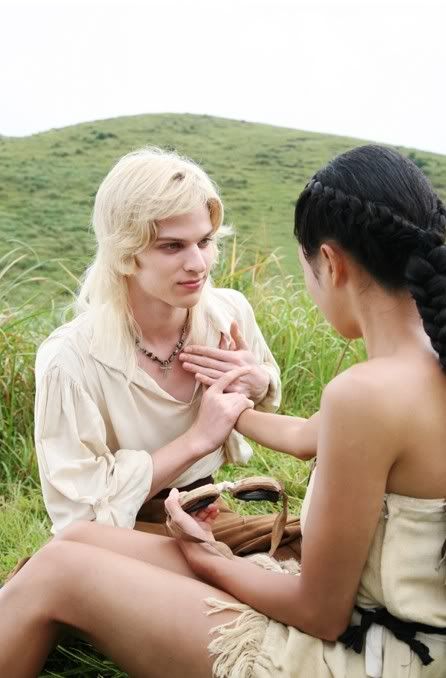
Yes, Beo Jin would have had a hard time adjusting to England, and would have missed her family terribly. But William would have done everything in his power to protect her, cherish her, and support her dreams, whatever it may be. I firmly believe that William and Beo Jin’s love for each other was strong, genuine and meaningful.
Both of them blossom by being with each other, having the support of each other. It’s a relationship that I can get behind and root for. It is only upon comparison to the relationship of Park Kyu and Beo Jin that the future of this coupling looks less viable a choice. But I don’t want to diminish and downgrade it, because the scenes of Beo Jin and William falling in love on Tamra are truly magical.
We first get to know Tamra through William’s eyes, who sees it through Beo Jin’s eyes. While William and Beo Jin was never going to be the OTP (raise your hands if you think “Bumbling Beo Jin in Brighton” would have made a hilarious comedy), theirs was nevertheless a love that transcended ethnicity and language, sustained by a purity that was enchanting to see.
Beo Jin and Park Kyu: its love as complicated, heartfelt and eternal as a geyser erupting from the ground, ain’t no one plugging that baby back:
Couple number two validates my continued efforts to instill patience in myself. What comes second, what takes time, what needs to be nurtured, may be worth it. Right off the bat you can tell these two have nothing in common. He is rich and a noble, she is poor and a peasant. He is intelligent and good at everything, she is not-too-bright and clumsy at everything. He understands reality and she often times lives in her own dream world. He has patience and she has none. He is statuesque and composed, she is a midget who flaps about. He is all ego and she is all id.
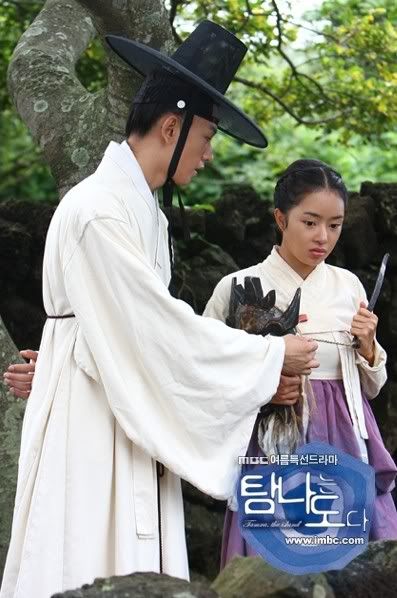
After spending time with Beo Jin, Park Kyu sees that her heart is wider than the sea she dives in, he has no choice but to acknowledge her goodness. The goodness that Beo Jin showers on everyone extends little by little to Park Kyu, until he finds himself talking to her, listening to her, and understanding her. Theirs is a relationship grounded first in friendship, then built on differences that are bridged by tacit mutual understanding.
Beo Jin knows that Park Kyu’s haughty noble exterior conceals a warm and generous heart. Park Kyu knows that underneath Beo Jin’s seemingly useless antics is a girl dreaming of doing something she’s good at. By the time Park Kyu has let Beo Jin into his heart, she has given hers away to William already. Im Joo Hwan’s portrayal of a Park Kyu torn between keeping the Beo Jin he loves besides him, or letting her attempt to leave (time and again) with William, was utterly heartbreaking.
What makes me so certain this pairing was the right conclusion (other than my all-abiding love for Park Kyu) was the maturity by which Beo Jin made her choice. I know I mentioned in my summary that Beo Jin instinctively dives into the water to save Park Kyu when he is injured in the final fight. In the drama, we see that her heart has been moving towards Park Kyu since their days in Hanyang.
Her choice was a long time coming inevitability that even William suspected deep down. She loved William, but her leaving with him was first motivated by a desperation to run away from her life on Tamra, then a desire to be with William. She loves and needs Tamra much more than she ever knew, and she grows to feel the same way about Park Kyu.
Water, water, everywhere, and I want to drink up every drop of every picaresque frame of this drama:
Discounting the first fifteen minutes of this drama (which is set in an alternate universe), Tamra is so beautiful to watch it captivates you from the first moment the camera trains its lens on the island. Each scene is filmed with such exquisite eye to detail. The entire production team put their very heart on the line to deliver this labor of love, and the viewer receives the message loud and clear.
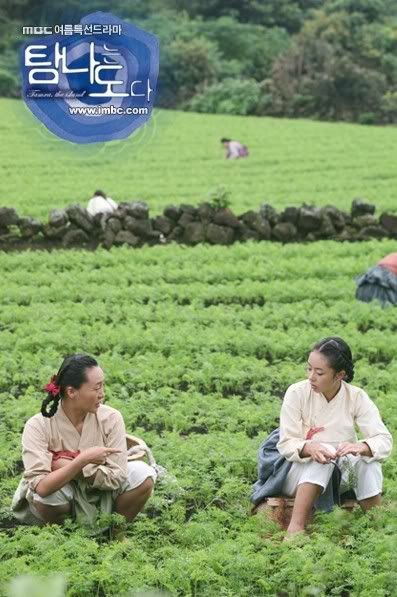
The first half of the drama is spent entirely on the island of Tamra. The PD wisely uses every opportunity to showcase this hidden jewel. We follow the lady divers on their expeditions to collect abalone, into the water and out bobbling along the waves. Beo Jin hides William in a cave, then in a mountainside hideaway, taking time to sneak around Tamra’s nooks and crannies.
A nighttime diving expedition, necessitated by the need to replace some stolen abalone offerings, takes us along with William, Beo Jin and some fireflies trapped in a glass lantern on a eerily magical swim through the mysterious depths of the ocean. Park Kyu spends the majority of his time with Beo Jin bickering around the Jang family home, but their interactions are framed with such playful tenderness set in the most humble of settings, allowing the emotions of the actors to spring forth and take flight.
The moments transition effortlessly from scene to scene. The PD understands implicitly that less is more. We don’t need flashy camera work, exquisite mood lighting, or even fancy sets or costumes. The PD knows he is working with sageuk fairy tale adapted from a manhwa, and his crowning achievement is capturing that light and bewitching spirit.
The PD’s effervescent touch matched the wonder and whimsy of its source material. Tamra is filmed by elevating the story not through technical directing prowess, but by convincing jaded viewers that the camera, to this day, remains a thing of capable of delivering delight and astonishment.

I absolutely loved the visuals and directing expertise of Tamra. By treating the story with respect, the PD shows that even if on the surface it seems kind of silly, maybe dopey, a bit childish, in reality may have so much purpose and humanity hidden in its slight frame.
The PD showed the beauty in the simplicity of life on Tamra. He underscored the islanders plight by showing us the happy moments that run like concurrent streams along with the harsh reality. Tamra does not aim for realism, such as making the villagers dirty, bedraggled, and run-down. Nor does it aim for majesty such as going for awe-inspiring vistas of Hanyang and the palace. Rather, the set, costuming and mood is to convey the feel of the lives of rich and common folks in Joseon with jaunty lightheartedness.
I can listen to this every day and every night, it’s the lullaby of an island that has imprinted itself on my consciousness:
The Tamra OST is one word: mesmerizing. It’s like a series of musical tributes to this beautiful island and its endearing residents. I can’t be the only one who loves the music that accompanied this drama. Raise your hand if there was a mad dash to download all the tracks? What’s so fabulous about the scoring is that it’s a blend of both traditional sageuk-suitable tunes paired with the playful feel of modern music.
I get goose bumps of happiness when I listen to the OST. Not only does it immediately transport me back to the magic of Tamra, but each song has a melody that wraps itself around your heart. I’m not sure if listening to the music for the first time, outside of the context of watching the drama, would elicit any response other than “hhhhmmm, interesting….”
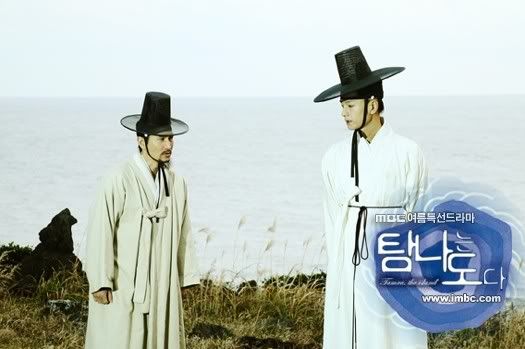
What makes the OST so exquisite is that it perfectly complements the tone, story and acting of the drama. The music is never overwhelming yet always smoothly lifts the impact of what you are watching decidedly up one entire notch. Now that is what I call a superb effort by music to tap into our subconscious heart strings and tune it without feeling like we’re being manipulated. My three favorite scores are the aptly named: Tamra the Island, Your Tears, and William. If I had to proffer an analogy, the music in Tamra is equal parts Enya blended with the soul and rhythm of Korean folk tunes.
One of my biggest gripes about drama-scoring is the failure of the PD to understand that there are two senses being engaged (well, I hope it becomes three someday, if I could smell the sexy men on screen, but scratch-n-sniff TV is but a pipe dream). If a PD spends all of his/her time being “I am Genius, look at me go boom-boom-pow”, and slaps a few random ditties on screen as an afterthought, it totally diminishes the awesome visuals.
What we see and what we hear need to blend together seamlessly to create something wholly greater than the sum of its parts. Tamra does this, and is one major factor in why this drama was such a successful organic production. [Mr. Koala wants me to tell you all that the OST is kick-ass good, not too syrupy, and used effectively and appropriately, not taking a few songs and recycling it from scene-to-scene].
You can have comfort, power and privilege, but what you need is love and family:
What I love about Tamra is that there is no giant catharsis. There is no game-changing moment, little emotional maneuvering, and no forced confrontations. The story progresses so naturally, the reactions and feelings comes so unbidden, it’s like the natural ebbs and flow of the ocean waves.
I do have favorite scenes, which are too numerous to list, but I’ll share a few nonetheless that really stood out. [Actually, many of the unforgettable scenes are the little moments that in other dramas I usually FF because it doesn’t include the OTP]. I absolutely loved every interaction between William and Beo Jin when she first rescues him and gets to know him on Tamra.
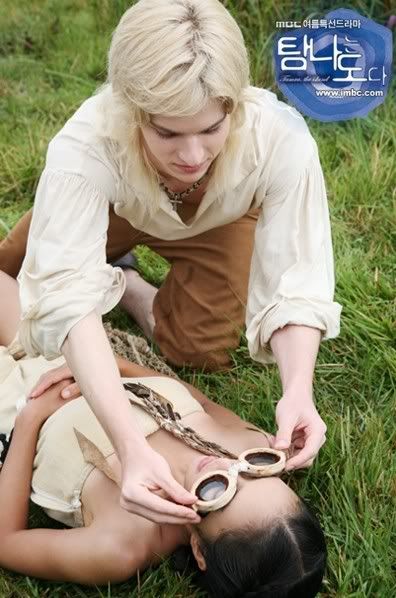
My favorite is probably their lazy afternoon date on the mountainside, when William gives Beo Jin diving goggles he’s fashioned out of two glass lenses. That scene captured everything that made William such a wonderful young man, and how his relationship with Beo Jin is shaped by how he listens to her to understand her (Beo Jin once told William that she hates diving because she can’t open her eyes underwater).
I swooned through every Park Kyu and Beo Jin interaction from mid-way through the drama onward. As their relationship grows beyond friendship, I loved how they were always willing to confront each other on any issue. My favorite is, hands down, the scene where Park Kyu thinks William is dead, gets piss drunk, runs off to tell Beo Jin, but can’t bring himself to say it, so instead he kisses the living daylights out of her. Yeah, that scene was good. Park Kyu’s relationship to Beo Jin is always shaped by what he thinks she needs and he can do for her.
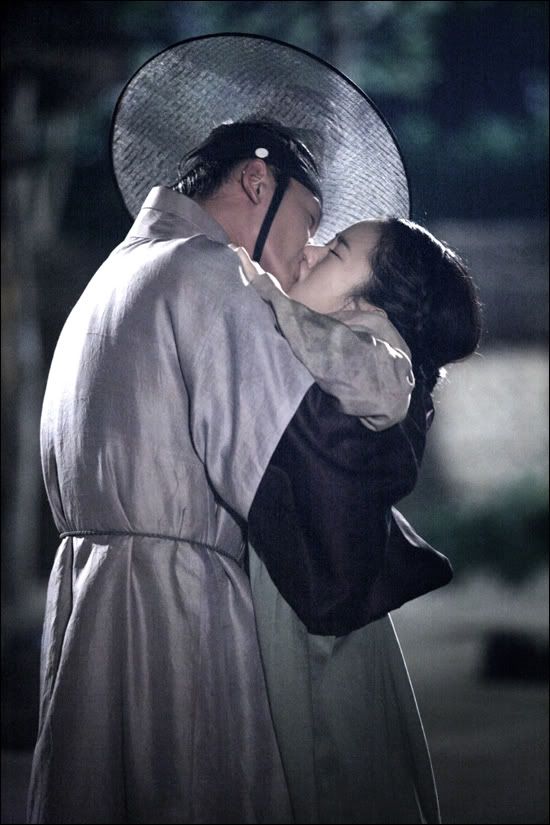
I have never watched a sageuk deal with a coming-of-age story before. William, who I oftentimes tease as being childish, is really just a young man who isn’t ready to settle down and assume the mantles of marriage and responsibility. But he’s not immature, just longing for some adventure. We hope that upon his return to Brighton, he’ll never forget Tamra and Beo Jin, but somehow find his own satisfaction in the world of his birthright.
He feels just like what Belle sings in Beauty in the Beast:
I want adventure in the great wide somewhere
I want it more than I can tell
And for once it might be grand
To have someone understand
I want so much more than they’ve got planned
Beo Jin doesn’t long for adventure as much as she longs for escape. Her attempts to run away only emphasize how much she loves Tamra. It was fitting that she returns to Tamra, finds that she can live there, and productively contribute to her home by doing something she is good at.
Even a sophisticated and worldy young man like Park Kyu undergoes his own maturation in this drama. This man who appears to have it all realizes that he wants so much more than he was born with. He wants the things that can only be earned: respect, admiration, and affection. And he finds it all on Tamra.
For Beo Jin and Park Kyu, I will borrow a refrain from Enya’s Long Long Journey:
Long, long journey
through the darkness,
long, long way to go;
but what are miles
across the ocean
to the heart that’s coming home?
We don’t always need to watch dramas that are marvels, spectacles, groundbreaking and mindboggling. The memorable stories that stay with me have been ones with incredible heart and hope.
I don’t want this review to end:
I stumbled upon Tamra by chance and initially watched it out curiosity. For a few weeks back in August of 2009, a bunch of ladies on Dramabeans OT were giggling, gushing and generally totally captivated by a weekend drama that I had no desire or intention to watch. These ladies were my friends, I trusted their taste, and was amused by all this out-pouring of affection for a low-rated sageuk (so low-rated, in fact, said sageuk got itself shortened from its intended run of twenty episodes down to sixteen, akin to putting a dying dog out of its misery).
Even after all the high-pitched squeals of glee, I was still rather uninterested in watching it. When they asked me if I was planning to watch, I said sure, but I wanted to wait until it was done airing so I could marathon it. In reality I was somewhat putting it off. What little I knew about the drama still didn’t seem that interesting, and I had serious doubts it was as good as the newly formed Team Park Kyu claimed.
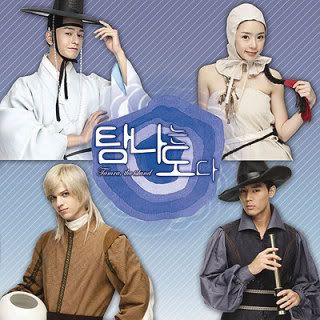
But I picked up the DVD on my next trip to the store. (The shopkeeper told me that those who bought Tamra recently reported that it was silly and boring. Was I sure I wanted to buy it? I reluctantly said yes, because I promised I would watch it). It sat on my shelf for a few days, which turned into one week, until finally I just wanted to get it over with. I wanted to be able to tell Team Park Kyu, “I watched Tamra, it was cute, thanks for the recommendation, I’m glad you all like Park Kyu so much”, and move on.
The first few episodes started off silly but with an inexplicable charm, and got progressively better and better. The turning point (that moment when you know you have just stepped over the line from I-am-merely-interested to I-can’t-stop-watching) came during the scene when Beo Jin tries to leave the house so that she can meet up with William to leave the island, and Park Kyu comes out to restrain her. That scene showed that this drama was not what I expected. I was effectively hooked.
I laughed and cried, I cheered and I fumed, I breathed and exhaled Tamra for the next few days. I ached for this drama that was so moving and beautiful, but had its life cut short by the curtailment of its intended run. The final few aired episodes had a truncated and disjointed air about it, as the PD rushed to cut it down to size. I knew this drama needed to be watched as it was intended, filmed with sincerity and dedication by everyone involved in the production.
Finally, eight months later, I got my hands on the newly released Director’s Cut edition of Tamra. More than any other drama that I loved and wanted to own on DVD, this one was extra special. I never watched the completed drama, only the Cliff Notes version (and still I loved it to pieces). This time around, I knew what treats lay in store for me. I popped disc one into the player and sat back to enjoy it again (a tiny bit worried that maybe it wouldn’t be as good this time around, one never knows).
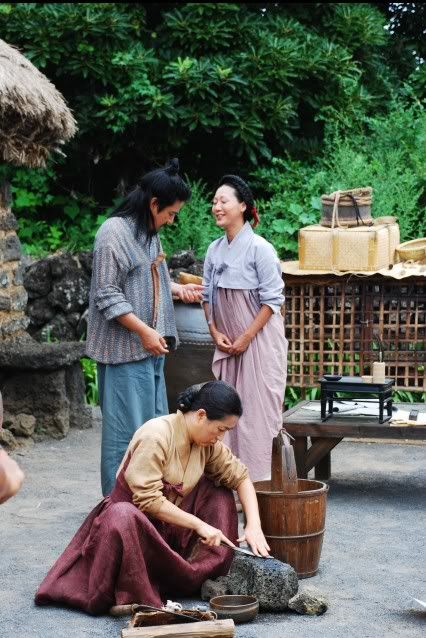
Mr. Koala was reading his newspaper next to me, ignoring the TV as usual. But he looked up when he heard broken English being spoken, wondering if I had suddenly decided to watch an American show. (Ha, dream on, buddy). He was full of snark for the William scenes, but then he continued to watch as the drama switched over to Tamra, falling silent as his eyes remained fixed on the screen. The rest, as you all know, is history. (Just so you know, my worry was for naught, Tamra gets better the second time around).
But we all must say goodbye some time:
This review I am dedicating to the founding members of Team Park Kyu (you know who you are). Without your effusive (and wholly justified) love of Tamra, I would have missed out on this hidden gem. That would have been a travesty, except I wouldn’t have known what I was missing. Now I do know, and I appreciate the recommendation all the more.
Thank you for sticking with me through what may go down as the single longest review ever written about a K-drama. [Mr. Koala: “Wife, I wish you’d put a tenth the attention to money-generating endeavors as you do to writing reviews for trivial entertainment purposes; then we’d be rich and I wouldn’t have to work as hard.” – ockoala to Mr. Koala: “If I did that, then I wouldn’t need to be married to you anymore.” Checkmate, sir].
I wish a happy journey to everyone, wherever you are, whatever you do. Team Park Kyu is now open to new members, please identify yourself when you join. I’m sorry this review was so interminably long, Tamra really touched on my talking bone along with my feel-good bone. In the end, I’m finally ready to say au revoire to my friends on Tamra. Content in my knowledge that, indeed, they lived happily ever after!

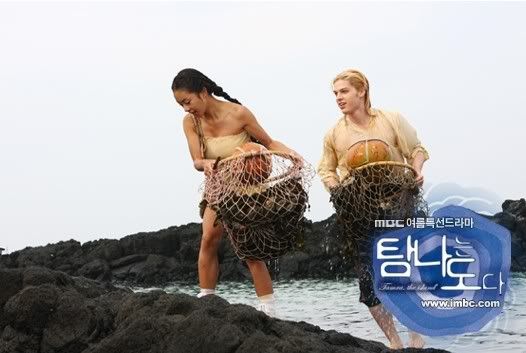
No comments:
Post a Comment